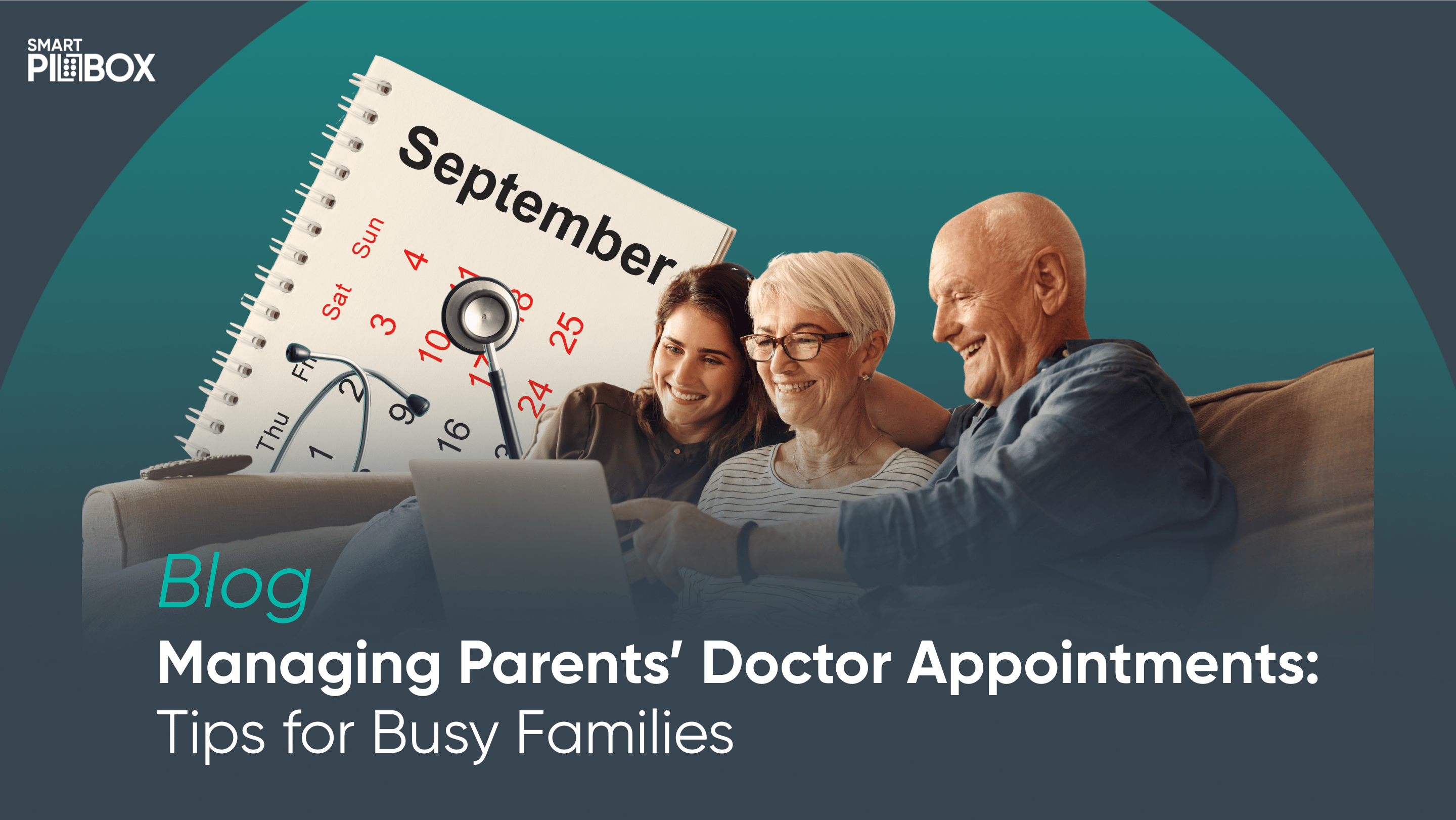Managing Parents’ Doctor Appointments: Tips for Busy Families

If you are helping an aging parent keep up with medications, multiple specialists, lab tests, and follow-ups, you already know it can feel like a second full-time job. Many families quietly juggle work, children, and their own health while trying to stay on top of elderly care. And let’s be honest, even the most loving caregiver can feel stretched too thin.
The truth is, managing aging parents is not just about making sure they see the doctor. It is about keeping track of every little detail—what medication they are on, what their last lab results showed, and when the next appointment is scheduled. Without structure, it is easy to miss something important.
So how do busy families stay organized without burning out? This guide will share caregiver tips that simplify everything from scheduling multiple visits to handling records, so you can give your parents the best possible senior health care without losing your peace of mind.
The Hidden Stress of Family Caregiving
When most people step into family caregiving, they do not expect the sheer amount of coordination it requires. It is not just one doctor. Seniors often have a team—primary care, cardiologist, eye doctor, dentist, maybe a neurologist or endocrinologist.
Add in transportation, remembering medical history, updating prescriptions, and suddenly, healthcare becomes a puzzle with too many moving parts. According to the Family Caregiver Alliance, nearly 70 percent of caregivers report that managing healthcare coordination is the most stressful part of their role.
The good news is there are practical systems, tools, and routines that can make life a lot easier.
How to Manage Doctor Appointments for Elderly Parents
The first step is building a process that works for your family. If you are wondering how to manage doctor appointments for elderly parents without chaos, try these steps:
- Centralize the Calendar: Have one master calendar that tracks all medical appointments. Digital apps like Google Calendar or dedicated caregiver apps are great, but even a large wall calendar at home works if everyone uses it.
- Batch Appointments: If possible, schedule more than one doctor on the same day. It reduces travel stress and helps seniors feel less disrupted.
- Confirm Details Early: Always double-check date, time, and location a few days in advance to avoid last-minute confusion.
- Prepare Questions in Advance: Keep a running list of concerns so you do not forget important issues once you are in the exam room.
These habits may sound simple, but they form the foundation for stress-free senior care coordination at home.
Tips for Scheduling Multiple Doctor Visits for Seniors
One of the hardest parts is balancing work, your own family, and your parent’s healthcare schedule. Here are tips for scheduling multiple doctor visits for seniors without losing control of your week:
- Prioritize by Urgency: If your parent has three follow-ups but one is more critical, schedule that first. Spread out non-urgent visits to avoid overload.
- Use Early Morning Slots: Seniors often feel most alert in the morning. Booking early helps avoid delays and reduces fatigue.
- Pair Healthcare with Fun: If you need to schedule a long day of appointments, plan a nice lunch or short outing afterward. It helps parents see medical visits as less of a burden.
- Keep Family Informed: Share the appointment schedule with siblings or relatives so they can step in when needed.
This way, you are not carrying the entire load of organizing elderly healthcare schedules alone.
Caregiver Checklist for Medical Appointments
Walking into a doctor’s office with your parent can feel overwhelming. Papers, prescriptions,
cards—it is easy to forget something. A simple caregiver checklist for medical appointments can keep you on track:
- List of all current medications, dosages, and timing
- Allergy list
- Insurance and ID cards
- Copies of recent test results or hospital discharge notes
- Notebook or phone for taking notes during the appointment
- A list of questions or concerns prepared in advance
This small act of preparation transforms you from reactive to proactive, making each visit more efficient and less stressful.
Managing Medical Records and Appointments for Parents
Paperwork is the hidden monster of senior health care. Each doctor has their own reports, labs, and charts. If you are not careful, information gets lost, and you risk duplicated tests or miscommunication.
Here are strategies for managing medical records and appointments for parents:
- Create a Binder or Digital Folder: Organize by specialty—cardiology, general medicine, labs, etc.
- Scan Documents: Keep digital backups on cloud storage so you can access them anytime.
- Share with Family: Give siblings access so everyone is informed and can help.
- Update After Every Visit: Do not let papers pile up. Add notes and results right away.
Staying organized makes it easier to advocate for your parent’s health.
The Best Way to Organize Healthcare for Aging Parents
Every family needs a system that is simple enough to follow daily but reliable enough to hold everything together. The best way to organize healthcare for aging parents is to combine structure with tools:
- Set Reminders: Use phone alerts or caregiver apps to notify you of upcoming visits.
- Use a Medication App: Learning how to keep track of parents’ medications and appointments is easier with digital tools. The MyPillPal App, for example, doubles as both a Pill Reminder App and a care coordination tool. It allows families to track adherence, appointments, and progress remotely.
- Assign Roles: If you have siblings, divide responsibilities—one manages appointments, another handles transportation, another keeps records updated.
This reduces burnout and creates a team approach to family caregiving.
Tools to Help Caregivers Manage Doctor Visits
Technology can be a lifesaver. There are several tools to help caregivers manage doctor visits without relying on scattered sticky notes or memory alone.
- MyPillPal App: Sends reminders for both medications and appointments, with remote monitoring for families.
- Shared Digital Calendars: Google or Apple calendars with alerts.
- Health Portals: Many hospitals now provide patient portals where you can download records and track test results.
- Caregiver Apps: Apps designed specifically for organizing elderly healthcare schedules make coordination easier.
The right tool reduces stress for both seniors and caregivers, while improving follow-through on care plans.
Family Caregiver Scheduling Tips
You might be juggling your parent’s health with school runs, work deadlines, and household chores. Here are a few family caregiver scheduling tips that prevent overwhelm:
- Plan a Week at a Time: Review the schedule every Sunday so you know what is coming.
- Color-Code Calendars: Use one color for work, another for personal, and a third for parent-related tasks.
- Build Buffer Time: Always leave extra time around appointments for delays or traffic.
- Delegate: When possible, ask other relatives to take on one or two visits.
These small shifts can make the load of family caregiving more manageable.
Senior Care Coordination at Home
Even outside of doctor visits, coordination matters. Seniors often need medication routines, physical therapy, diet adjustments, and social activities to stay healthy.
Strong senior care coordination at home means blending medical care with daily living:
- Sync meal times with medication reminders.
- Schedule exercise around energy levels.
- Balance medical routines with fun, social activities.
- Use apps like MyPillPal to keep families connected and informed in real time.
When healthcare fits naturally into the rhythm of home life, it feels less like a burden and more like part of daily living.
How to Keep Track of Parents’ Medications and Appointments
One of the biggest challenges is figuring out how to keep track of parents’ medications and appointments consistently. Missed doses or double dosing can be dangerous. Missed appointments delay care.
That is where technology helps. A simple Pill Reminder App like MyPillPal reduces stress for everyone. It not only reminds seniors to take their medication, but also notifies caregivers if a dose was missed. Families can track both meds and doctor visits from one dashboard.
This keeps parents healthier and caregivers more confident.
Final Thoughts
Managing your parent’s healthcare does not have to feel like an endless juggling act. By creating systems, using caregiver-friendly tools, and following senior self-care tips, families can stay on top of everything without constant stress.
The secret is building habits—keeping a master calendar, using a caregiver checklist for medical appointments, storing records neatly, and relying on apps that simplify daily coordination.
When families embrace structure, healthcare becomes less about scrambling and more about peace of mind. Your parents feel cared for. You feel in control. And everyone enjoys more quality time together.
If you want a simple place to start, try the MyPillPal App. It combines medication reminders with tracking, giving families a clear system for organizing elderly healthcare schedules.
For those who want an extra layer of support, the app also pairs with the Smart Pillbox device, which makes following prescriptions even easier with timely alerts and dose tracking. Because the best care is not just about seeing the doctor, it is about living every day with confidence and peace of mind.
👉 Download the MyPillPal App today!


